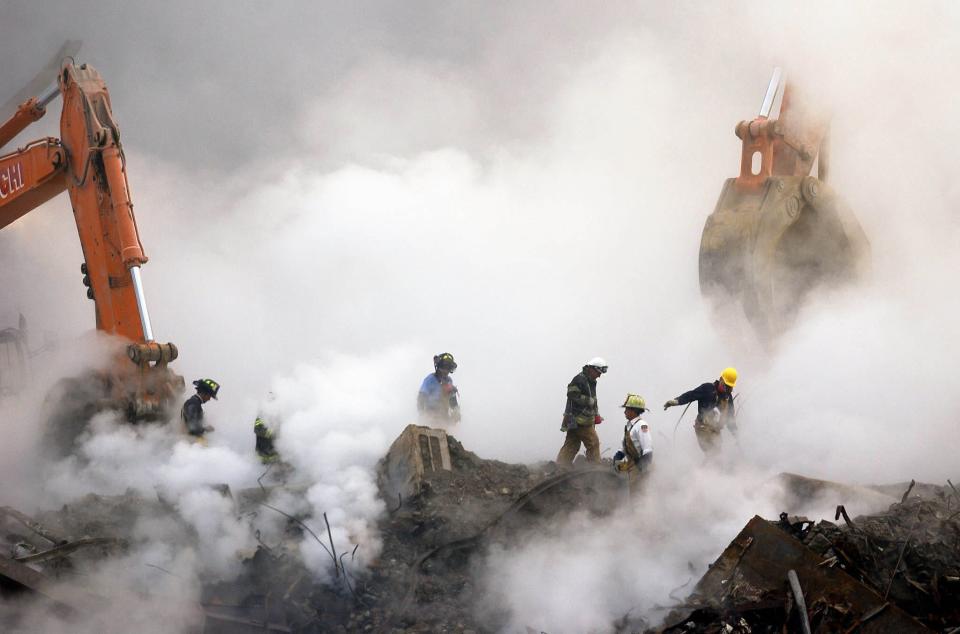Compensation fund for 9/11 responders passes the Senate, goes to Trump to sign
WASHINGTON – The firefighters, police officers and other emergency personnel who risked their lives answering the call Sept. 11, 2001, finally got the rescue they've been demanding.
Tuesday, the Senate passed a bill, 97-2, that would replenish a fund set up shortly after the terror attacks in New York City and at the Pentagon to compensate first responders who suffered illnesses, injuries and other medical problems as a result. The bill goes to President Donald Trump for his signature into law.
Sen. Rand Paul, R-Ky., and Sen. Mike Lee, R-Utah, were the only two senators to vote against the bill. The two senators offered amendments to the bill Tuesday that would have limited how much federal taxpayers would cover compensation costs. Both amendments were defeated by large margins.
Sen. Kirsten Gillibrand, D-N.Y., a sponsor of the bill, called on her fellow senators to "have empathy, just that bit of care for someone else" to support the first responders.
Former "Daily Show" host Jon Stewart, an advocate for the bill's passage, spoke alongside first responders and advocates after the vote.
"We can never repay the 9/11 community for what they've done, but we can stop penalizing them. ... There have been too many funerals, too many hospices," Stewart said. "Their facilities deserve better."
Joe Zadroga, whose son died from respiratory illnesses contracted after 9/11, thanked the assembled lawmakers and advocates for their work to get the fund approved. His son, James, was a former New York City Police Department detective.
"I'm proud that we're here today and we got this bill passed," Zadroga said. "I never want to come back here again. All I want to come back here for is a guided tour."
The 2010 iteration of the fund was named after James Zadroga.
Despite the broad support, the effort to essentially make the fund permanent has been the subject of a caustic political fight on Capitol Hill in recent weeks.
Stewart called the delay in passing a bill "shameful." Paul, who raised concerns about the cost, blasted the comedian as uninformed. Sept. 11 survivors feuded with Senate Majority Leader Mitch McConnell, R-Ky., for not moving fast enough.
'Absolutely outrageous': Jon Stewart slams Rand Paul for delaying 9/11 bill

The September 11th Victim Compensation Fund (VCF) has gotten so depleted that awards were cut in half this year when it became unclear whether Congress would add any more money.
Emergency personnel "responded in five seconds. They did their jobs – with courage, grace, tenacity, humility," Stewart told a House committee hearing in June on the fund's status. "Eighteen years later, do yours!"
By a 402-12 vote, the House passed the bill that would extend the fund this month. It looked like it would sail through the Senate by a voice vote when Paul objected to it last week, forcing a delay that led to Tuesday's floor vote.
"Not blocking the 9/11 bill," the Kentucky senator tweeted after his move prompted a firestorm of criticism. "Simply asking for a vote on an amendment to offset the cost."
Covering costs: Sen. Rand Paul delays attempt to reauthorize 9/11 first responder bill, cites cost as the reason
Emotional testimony: Jon Stewart, first responders, give emotional testimony before Congress on 9/11 victim fund
More than 340 New York City firefighters died Sept. 11, 2001, responding to the attacks. Since then, 200 more have died from illnesses contracted at Ground Zero.
The Congressional Budget Office estimated that paying out the outstanding claims and future claims would cost $10.2 billion over the next decade – a price tag Paul said should not be added to the national debt without exploring programs that could be cut to cover the cost.
More: Donald Trump, congressional Democrats reach two-year budget deal
The latest iteration of the fund was initially allocated a maximum of about $7.4 billion. In February 2019, the fund started to run out of money, having exhausted $5 billion of its allocation. As a result, the fund cut compensation to victims.
Unless the fund is replenished, outstanding claims would be paid at 50% of their original value, according to the fund's website, and any claims filed after February 2019 would be paid at 30% of their original claim value – changes that could affect thousands of people.
The VCF said that at the end of May, there were 16,715 eligibility claims being processed. The average compensation amount was about $243,000, and the highest amount was a $4.1 million claim.
Contributing: Jason Lalljee

This article originally appeared on USA TODAY: Senate approves financial lifeline for 9/11 first-responders
